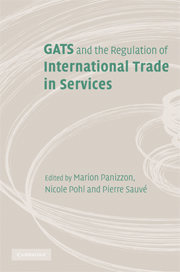Book contents
- Frontmatter
- Contents
- Contributors
- List of figures
- List of tables
- List of abbreviations
- Preface
- PART 1 Beyond regulatory control and multilateral flexibility: Gains from a cosmopolitan GATS
- PART 2 Unexplored economic, political and judicial dimensions of GATS
- PART 3 The limits of request–offer negotiations: Plurilateral and alternative approaches to services liberalisation
- PART 4 GATS case law: A first assessment
- PART 5 Market access, national treatment and domestic regulation
- 14 Some thoughts on the concept of ‘likeness’ in the GATS
- 15 Comment: The unbearable lightness of likeness
- 16 Towards a horizontal necessity test for services: Completing the GATS Article VI:4 mandate
- 17 Comment: Quis custodiet necessitatem? Adjudicating necessity in multilevel systems and the importance of judicial dialogue
- PART 6 Unfinished business: Safeguard and subsidy disciplines for services
- PART 7 Challenges to the scope of GATS and cosmopolitan governance in services trade
- PART 8 Conclusion
- Index
17 - Comment: Quis custodiet necessitatem? Adjudicating necessity in multilevel systems and the importance of judicial dialogue
from PART 5 - Market access, national treatment and domestic regulation
Published online by Cambridge University Press: 03 September 2009
- Frontmatter
- Contents
- Contributors
- List of figures
- List of tables
- List of abbreviations
- Preface
- PART 1 Beyond regulatory control and multilateral flexibility: Gains from a cosmopolitan GATS
- PART 2 Unexplored economic, political and judicial dimensions of GATS
- PART 3 The limits of request–offer negotiations: Plurilateral and alternative approaches to services liberalisation
- PART 4 GATS case law: A first assessment
- PART 5 Market access, national treatment and domestic regulation
- 14 Some thoughts on the concept of ‘likeness’ in the GATS
- 15 Comment: The unbearable lightness of likeness
- 16 Towards a horizontal necessity test for services: Completing the GATS Article VI:4 mandate
- 17 Comment: Quis custodiet necessitatem? Adjudicating necessity in multilevel systems and the importance of judicial dialogue
- PART 6 Unfinished business: Safeguard and subsidy disciplines for services
- PART 7 Challenges to the scope of GATS and cosmopolitan governance in services trade
- PART 8 Conclusion
- Index
Summary
Necessity as a (contentious) element of world trade law
The requirement that a measure should not be more trade-restrictive or burdensome than necessary to achieve a specific goal is a central, but contentious element of the multilateral trading system. Two functionally different contexts of a necessity test need to be distinguished: necessity can be part of the requirements of an exception clause, such as Article XX GATT. In this case, necessity only becomes relevant for the justification of a measure, which would otherwise be GATT-inconsistent. This context is the traditional sedes materiae of necessity and has been part of the world trading system since 1948. More recently, and especially with the entry into force of the WTO Agreement, necessity tests have also been integrated in positive obligations, in particular in the TBT and SPS Agreements. Necessity tests are not restricted to the multilateral trading system. In various degrees, they can also be found in exception clauses and positive obligations of regional integration and bilateral trade agreements.
The GATS contains references to both types of necessity tests: the general exception clause of Article XIV GATS includes necessity tests which are similar to the ones in Article XX GATT. The necessity test in the negotiating mandate of Article VI:4 GATS envisages a positive requirement. As Panos Delimatsis rightly recalls, this necessity test is a controversial subject of the negotiations on disciplines on domestic regulation in the WTO.
- Type
- Chapter
- Information
- GATS and the Regulation of International Trade in ServicesWorld Trade Forum, pp. 397 - 404Publisher: Cambridge University PressPrint publication year: 2008
- 3
- Cited by



